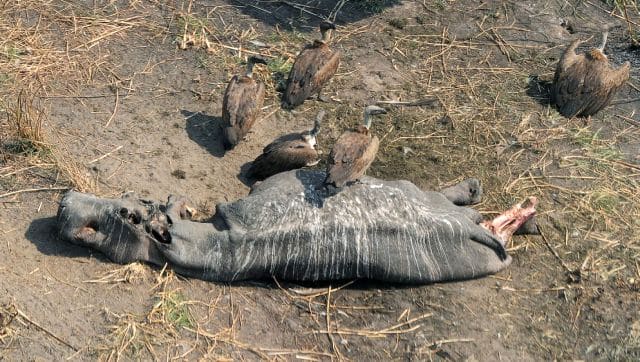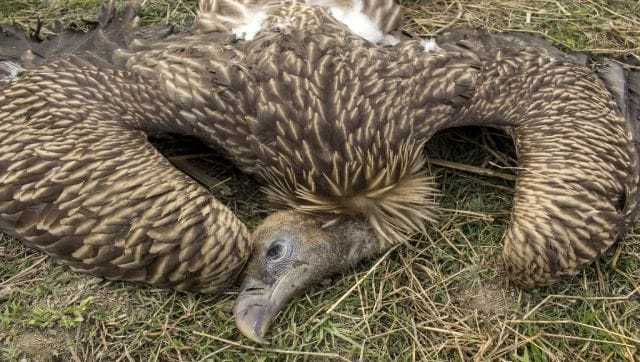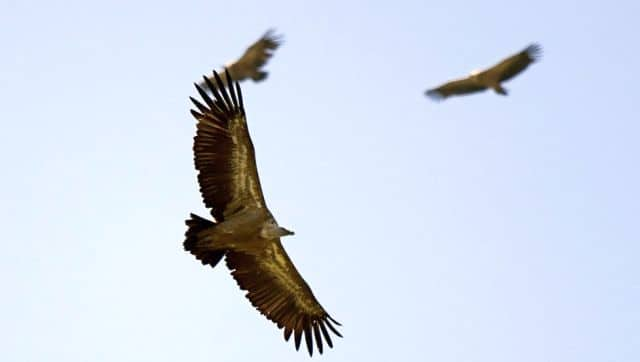You’ve heard of tiger conservation and cheetah conservation. Well, now we have vulture conservation. You read it right. Tripura, the northeastern state, has announced that its forest department will carry out a project to breed endangered vulture species in Khowai district through a programme for ‘vulture conservation and artificial breeding’. In light of this program, here’s a look at the condition of this scavenger bird in India, the crises it faces and why such programs are much-needed to re-balance the ecosystem: Vultures in India India is home to nine species of vultures, but most of them face extinction. As of date, the Oriental White-backed Vulture, the Long-Billed Vulture, the Slender-Billed Vulture and the Red-Headed Vulture are critically endangered. The Egyptian Vulture, according to the International Union for Conservation of Nature Red Data Book, is endangered and the Himalayan Vulture, the Cinereous Vulture and the Bearded Vulture have been placed in the ‘Near Threatened’ category. In the 1980s, India was home to around 40 million vultures primarily belonging to three species – Oriental White-Backed, long-billed and slender-billed. By 2017, that number had declined to 19,000. According to a report published by DownToEarth, India has lost 99 per cent population of the three species — Oriental White-Backed Vulture, Long-billed Vulture and Slender-billed Vulture. The Red-headed and the Egyptian Vulture populations have also crashed by 91 per cent and 80 per cent respectively. Asad Rahmani, former director of the Bombay Natural History Society, was quoted as telling Scroll, “This is the fastest decline of any bird species ever reported anywhere in the world.” [caption id=“attachment_10355591” align=“alignnone” width=“640”]  Vultures are one of the most effective scavengers. They only eat dead animal carcass. They remove bacteria and other poisons in the environment quickly, consuming carcasses before they decay. AFP[/caption] Why are vultures important? Researchers have time and time again reiterated the critical role scavengers play in ecosystems and food webs. By consuming dead animals, scavengers remove carcasses from the environment. This is a valuable service that goes beyond keeping the environment clean and beautiful. Vultures are one of the most effective scavengers. They only eat dead animal carcasses. They remove bacteria and other poisons in the environment quickly, consuming carcasses before they decay. Additionally, their stomachs contain a powerful acid that destroys many of the harmful substances found in dead animals. The birds also prevent the contamination of water sources, especially in the wild. When animals die near watering holes, there is an imminent danger of contamination resulting in a quick spread of infections and mass death.
But vultures completely devour the carcasses thereby preventing a tragic mishap.
As Deepak Apte, former director of Bombay Natural History Society explained to The Times of India, “Vultures are often misunderstood and considered lowly creatures. They play a key ecological role providing society with health benefits. Vultures formerly disposed of 10 million tonnes of rotting meat every year in India. This role has diminished with 99 per cent decline over the last 20 years, with implications for environment, economics and human health.” He added that since there aren’t enough vultures, there has been an increase in dogs feeding on carcasses. “As the main vector of rabies that kills an estimated 7,000 people in India every year, this is a cause of concern,” he added in the same report. Vultures are critically important to the Parsi community. The community leaves its dead atop the Towers of Silence to be consumed by vultures. Today, the Parsis may have turned to other methods, including solar accelerators to hasten the decomposition of the dead, but none has proved as efficient or as hygienic as vultures. [caption id=“attachment_10355551” align=“alignnone” width=“640”]  A dead vulture lies outside the Panidihing Bird Sanctuary in the Sivasagar district of Assam. In the 1980s, India was home to around 40 million vultures primarily belonging to three species – Oriental White-Backed, long-billed and slender-billed. By 2017, that number had declined to 19,000. AFP[/caption] What went wrong? While there isn’t one exact cause for the precipitous plunge, many biologists believe that the heavy dependency on a drug called diclofenac could be a major culprit. Diclofenac is a non-steroidal anti-inflammatory drug (NSAID), which is used to treat cattle, as well as human beings. The drug came as a godsend for livestock owners as it is a fast-acting, effective painkiller and also soothes fevers. Plus, it is cheap, costing about Rs 20. However, it was found that vultures, which are exposed to diclofenac after feeding on the carcass of dead farm animals, died of kidney failure. Of India’s nine species of vultures, diclofenac affects the Oriental White-Backed Vulture, Slender-Billed Vulture and the Long-Billed Vulture the most. The Eurasian Griffon Gyps fulvus and Himalayan Griffon Gyps himalayensis, while impacted, were spared the massive decline. Prakash Javdekar, former Union Minister for Environment, Forests and Climate Change, had highlighted how dangerous the drug is to vultures in Parliament. “Just 0.4-0.7 per cent of animal carcasses contaminated with diclofenac was sufficient to decimate 99 per cent of vulture populations,” he was quoted as saying. Furthermore, vulture populations declined due to habitat loss, food unavailability and electrocution. Cutting down trees for agriculture, urbanisation and firewood purposes, a cause of habitat degradation is a threat to the nesting sites of vultures. Fire and grazing also decrease the safe roosting and nesting sites of vultures. Another reason for its declining population was that the Oriental White-Backed Vultures’ breeding site was mostly located around roads. Human activities and traffic on the roads is a cause of concern as vultures may feed on roads making them prone to accidents. [caption id=“attachment_10355571” align=“alignnone” width=“640”]  The government and the conservation community have been practising various methods to revive the vulture population. AFP[/caption] Conservation efforts Realising the need to reverse this trends, the government and the conservation community have been practising various methods to revive the vulture population. The Centre in 2020 launched a Vulture Action Plan 2020-25 for the conservation of vultures in the country. The Drugs Controller General of India has banned the veterinary use of diclofenac. The Central Zoo Authority (CZA) and Bombay Natural History Society (BNHS) also established the Vulture Conservation Breeding Programme. Under this programme, eight centres have been established and, so far, 396 vultures of the three species have successfully fledged. In another initiative to conserve the declining vulture population, ‘vulture restaurants’ were also set up – the first one in 2015 at Phansad Wildlife Sanctuary in Raigad district. The restaurant for the vulture provides carcasses of cattle, free of diclofenac, to feed on at specific places, especially during the breeding season. Tripura’s vulture conservation Seeing that Tripura’s Khowai had a higher concentration of vulture population, officials added that vultures would be brought in from other states to help in the artificial breeding. Divisional Forest Officer (DFO) of Tripura’s Khowai, Niraj K Chanchal said that the project would soon be set up at Padmabil area in Khowai district with money sanctioned by the Central Government. There would be artificial breeding by bringing vultures from Haryana and then the offspring would be released in wild. “Recently around 30-40 vultures were sighted in the district. About a decade back the scavenger bird was almost extinct in the state, but the population is on the rise now due to improvement of their habitat by the forest department”, he was quoted as telling news agency PTI. The Conservation Breeding Program appears to be the only action, which could save the vultures from extinction, Principal Chief Conservator of Forest (PCCF), DK Sharma said. Also, Tripura forest officials have launched an awareness campaign among the locals for planting more Shimul trees, because the vultures roost in such leafy trees. With inputs from agencies Read all the Latest News , Trending News , Cricket News , Bollywood News , India News and Entertainment News here. Follow us on Facebook, Twitter and Instagram.


)

)
)
)
)
)
)
)
)



